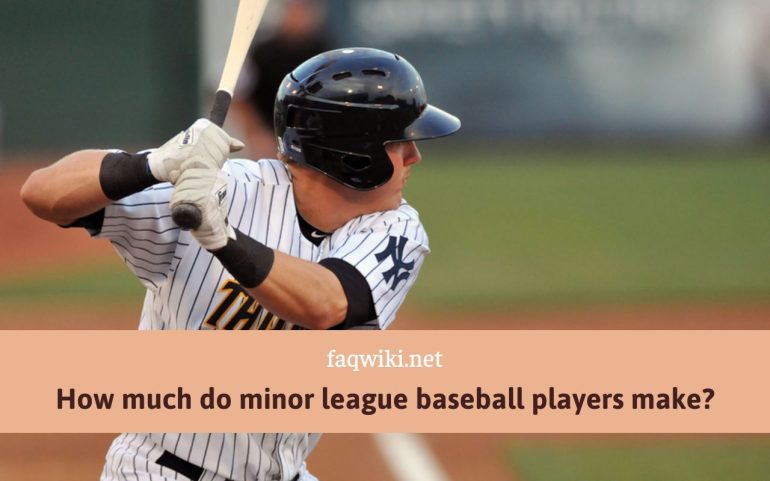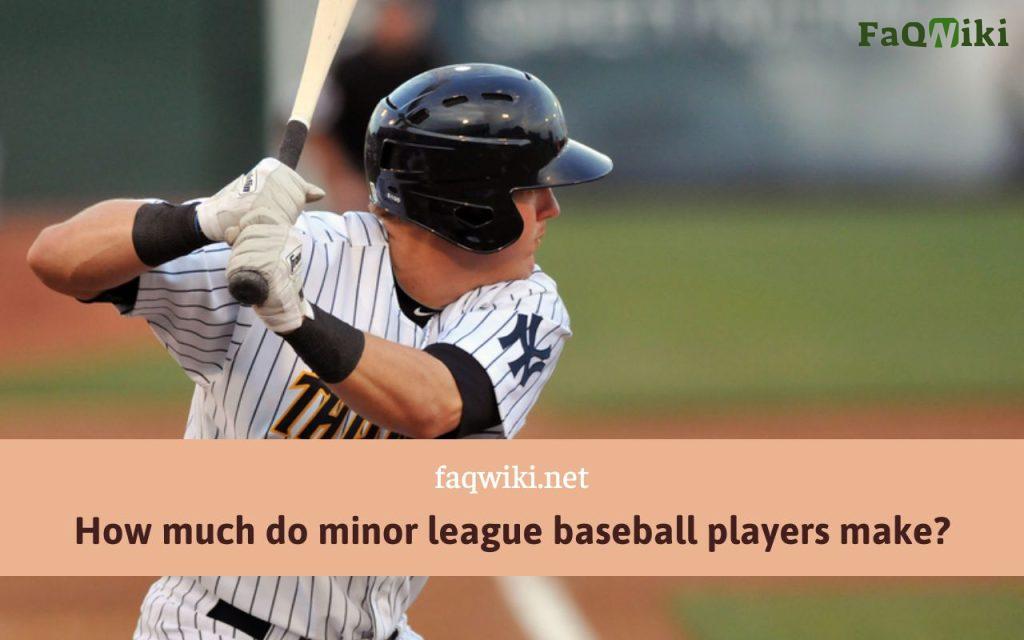How much do minor league baseball players make?

Minor League Baseball (MiLB) is an essential component of the baseball industry, which acts as the breeding ground for the future stars of Major League Baseball (MLB). But how much do minor league baseball players make? This article aims to provide a comprehensive analysis of the structure of minor league baseball salaries, factors affecting salaries, recent changes, and future predictions.
In the past, minor league baseball players were notoriously underpaid, which led to several lawsuits against MLB. However, the recent negotiations between MLB and MiLB have resulted in significant changes in minor-league salaries. This article provides an overview of the history of minor-league baseball salaries and how the system has evolved over the years.

How much do minor league baseball players make? – faqwiki
Minor League Baseball Salaries
The salary structure for minor league baseball players is based on the player’s level of play and the number of years of experience. The minimum salary for minor league players is $1,160 per month, while the maximum salary is $2,700 per month. However, this salary does not reflect the actual earnings of minor-league baseball players.
Minor league players are only paid during the regular season, which lasts for approximately six months. Therefore, their earnings are limited to six months of the year, and they are not paid during the offseason. Moreover, minor league baseball players do not receive overtime pay, despite working long hours, which can extend to more than 12 hours a day.
In addition, minor league baseball players are responsible for their transportation, housing, and food expenses, which can be significant. The cost of living varies from one league to another, with players in Triple-A leagues earning the highest salaries and receiving the most benefits.
Factors Affecting Minor League Baseball Salaries
Several factors influence the salaries of minor-league baseball players. These include the player’s position, draft position, level of play, and bonuses and incentives.
Players in certain positions, such as pitchers and catchers, are more likely to receive higher salaries than players in other positions. Pitchers and catchers are considered more valuable because they are involved in every game and are essential to a team’s success.
The draft position is another crucial factor that influences the salaries of minor-league baseball players. Players who are drafted in the early rounds are likely to receive higher signing bonuses and, subsequently, higher salaries than those drafted in later rounds.
The level of play is also a significant determinant of salaries. Players in higher-level leagues, such as Triple-A, are more likely to earn higher salaries than those in lower-level leagues, such as Single-A.
Finally, bonuses and incentives play a crucial role in determining minor league baseball players salaries. Players can earn additional income through performance-based incentives, such as hitting a specific number of home runs or achieving a certain number of stolen bases.
Life as a Minor League Baseball Player
Life as a minor league baseball player is not glamorous, and players face several challenges, both on and off the field. Minor league baseball players work long hours and face intense competition, with only a small percentage of players making it to the major leagues.
Moreover, minor league baseball players often struggle financially, despite being talented athletes. The salaries are barely enough to cover basic living expenses, and players have to take on additional jobs during the offseason to make ends meet.
However, minor-league baseball players have found ways to cope with these challenges. Many players rely on the support of their families and teammates, while others take on second jobs during the offseason. Some players also have side hustles, such as coaching or teaching baseball clinics.
Recent Changes in Minor League Baseball Salaries
In addition to the minimum salary, players may receive additional bonuses and benefits. For example, some players receive signing bonuses when they first join a team, and they may earn performance-based bonuses for achieving certain goals, such as hitting a certain number of home runs or pitching a certain number of innings. Players may also receive benefits such as health insurance, paid vacation days, and retirement plans.
Despite these benefits, however, many minor-league baseball players struggle to make ends meet. With salaries often below the poverty line, many players have to take on second jobs during the off-season or rely on financial assistance from family and friends. This can make it difficult for players to focus on their baseball careers and improve their skills, as they may have to work long hours outside of the sport.
The Economics of Minor League Baseball
The economics of minor league baseball are complex and often misunderstood. While the sport generates billions of dollars in revenue each year, much of that money goes to the major league teams rather than the minor league players themselves.
One reason for this is that minor-league baseball teams operate as franchises of major league teams. As a result, the major league team provides the funding for the minor league team and is responsible for paying the salaries of the players. This means that the major league team is the one that benefits financially from the success of the minor league team.
Another factor is the cost of operating a minor league team. While some teams are profitable, many others struggle to make ends meet, especially those in smaller markets or with older facilities. As a result, some teams have to cut costs wherever they can, including player salaries.
The Future of Minor League Baseball Salaries
The issue of minor league baseball salaries has gained increased attention in recent years, with many advocates calling for reforms to improve pay and working conditions for players. In response, Major League Baseball has taken steps to address some of these concerns.
In 2018, for example, Major League Baseball announced an increase in minimum salaries for minor league players, with pay increases ranging from 38% to 72%. The league also announced plans to improve working conditions for players, including better transportation, housing, and meal allowances.
Despite these changes, however, many advocates argue that more needs to be done to improve the economic situation for minor league baseball players. Some have called for the implementation of a living wage for players, while others have suggested that minor league players should be unionized in order to negotiate better pay and working conditions.
Conclusion
In conclusion, the issue of how much minor league baseball players make is a complex one that involves a range of factors, including the economics of the sport, the structure of minor league teams, and the cost of operating a team. While recent reforms have improved the situation for some players, many still struggle to make ends meet and face significant financial challenges.
As the debate over minor league salaries continues, it is clear that more needs to be done to improve the economic situation for these players. Whether through increased salaries, better benefits, or improved working conditions, it is important that the sport of baseball does its part to support the next generation of players and ensure that they have the resources they need to succeed both on and off the field.
FAQs
How much do minor league baseball players make?
- Minor league baseball players typically make between $5,500 and $10,000 per season, with many earning salaries below the poverty line.
Do minor league baseball players receive benefits?
- Yes, minor league baseball players may receive benefits such as health insurance, paid vacation days, and retirement plans.
What is the economic structure of minor-league baseball?
- Minor league baseball teams operate as franchises of major league teams, with the major league team responsible for providing funding and paying player salaries.
